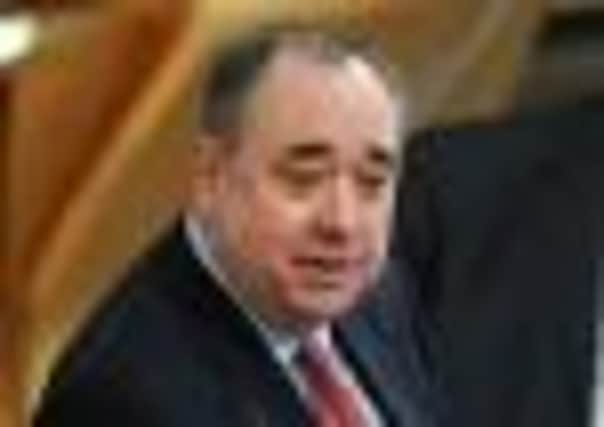Press regulation: Salmond distances self from plan


The First Minister said a report from a group led by former judge Lord McCluskey backing mandatory regulation in Scotland was “not the view of the government or government ministers”.
The proposed Scottish regime goes further than the measures set out by Lord Justice Leveson, who did not propose a mandatory system following a UK-wide inquiry into phone hacking.
Advertisement
Hide AdAdvertisement
Hide AdMr Salmond’s intervention came as Labour demanded a full Holyrood debate this week on the McCluskey proposals that would see a regulatory body set up by the industry and a “recognition commissioner” appointed by ministers.
Labour leader Johann Lamont said that Mr Salmond had handed Lord McCluskey a “completely different remit” after it emerged his report said a voluntary system, where publishers sign up to a new regulatory system, as laid down by Leveson, will not work.
The First Minister said that he was in favour of “voluntary, self-regulation” of the press as he insisted that the McCluskey plan was “not done and dusted”.
Mr Salmond went on to say that the report by the expert group, which the First Minister himself set up, “goes further” than his own position on press regulation. Social networking sites such as Twitter and Facebook would be covered by the set-up outlined by the group.
The First Minister, speaking yesterday, would only say that the report was a “contribution to the debate” on media standards in the wake of the phone-hacking scandal.
He added: “Page two says it’s not the view of the government or government ministers. I am in favour of voluntary, self-regulation of the press.
“The McCluskey report is a contribution to the debate. It’s not done and dusted.
“I think there’s a lot talking yet to be done, but we should welcome contributions to the debate and also, rather than see Leveson as a great threat, I think it’s actually an opportunity to establish a good, strong relationship between a free press and the people of the country.
Advertisement
Hide AdAdvertisement
Hide Ad“My position has been to support voluntary self-regulation of the press, and in some respects the McCluskey group goes further, but look, this is a contribution to a debate that should go on.”
Meanwhile, Ms Lamont, in a letter to the First Minister, called on Mr Salmond to answer questions on the McCluskey report at Holyrood this week.
She said: “I believe that we should have a full debate on the McCluskey report as soon as possible. This is too important to be left to briefings and the pages of the newspapers.”
She accused Mr Salmond of abandoning a cross-party approach on the issue of press regulation reform.
She said: “You asked for all-party consensus. You got that to ask the expert panel what practically would have to happen to incorporate Leveson into Scots law.
“Then you decided to give Lord McCluskey a completely different remit from that we had agreed. At no point did I, or any other party leader, agree to a complete re-working of Leveson.”
A spokesman for the First Minister said that a debate would be held on the McCluskey report after Holyrood’s Easter recess.
‘Deal may still be possible’
A deal on press regulation is still possible, politicians have insisted prior to a crunch vote in the House of Commons on the issue.
Advertisement
Hide AdAdvertisement
Hide AdLabour and the Liberal Democrats are lining up against the Conservatives in a coalition for a tougher regime.
All parties propose using a royal charter to create a watchdog body in response to the recommendations of the Leveson Inquiry. However, the Lib-Lab version involves underpinning the system in legislation, opposed by Prime Minister David Cameron.
It also rules out a veto for the press over the membership of the watchdog and gives the regulator the power to enforce the publication of prominent apologies.
Chancellor George Osborne and Labour’s deputy leader, Harriet Harman, said they hoped the parties could agree on the terms before the vote.